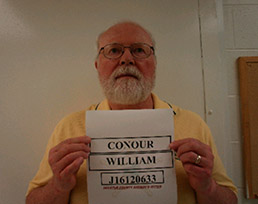Subscriber Benefit
As a subscriber you can listen to articles at work, in the car, or while you work out. Subscribe NowAn Indiana lawyer being disciplined isn’t necessarily news. This year, the Indiana Supreme Court issued more than 80 disciplinary orders, sometimes dealing with the same attorney matter. But some cases do stand out more than others, like when a judge’s discipline case is believed to be the most voluminous judicial disciplinary proceeding in the state’s history. Marion Superior Judge Kimberly Brown faces 47 counts of judicial misconduct, which include accusations of delayed releases of at least nine inmates from jail and failing to properly oversee her court. The Judicial Qualifications Commission called 39 witnesses against the judge and compiled more than 190 exhibits alleging a catalog of judicial misconduct.
 William Conour. (IL file photo)
William Conour. (IL file photo)Brown stunned many when, in her deposition video, she refused to be sworn, saying “I am always an officer of the court. I am a judge.” She took the oath when she testified at her weeklong disciplinary hearing in November.
The Judicial Qualifications Commission accuses her of systemic neglect and failing to do her judicial duties; Brown argues that her staff is to blame for much of her alleged misconduct.
The three masters on the case – retired Monroe Circuit Judge Viola Taliaferro, Boone Superior Judge Rebecca S. McClure and Lake Superior Judge Sheila M. Moss – had to turn in their report to the Supreme Court by Dec. 30. Then it’s up to the justices to decide what, if any, discipline to impose against Brown. Brown is asking for a 60-day suspension; the Judicial Qualifications Commission has recommended she be removed from office.
Ex-attorney William Conour made headlines again this year after pleading guilty in federal court to one count of wire fraud, for which he received a 10-year sentence. The U.S. attorney argued Conour deserved 20 years for stealing nearly $7 million from more than 30 clients over the years. Conour took money that was supposed to go to wrongful-death and personal-injury clients and their families. His attorney argued for leniency. The 10-year sentence is less than the advisory range of 14 to 17.5 years. Both Conour and the government are appealing his sentence.
Conour was charged with wire fraud in April 2012.
 Brown
BrownIndiana University Robert H. McKinney School of Law announced it would return the $450,000 donation Conour and his now ex-wife Jennifer made to the school, which named its atrium after the couple. The $30,000 Conour donated to the Indiana Trial Lawyers Association four years ago was also donated by the association to a restitution fund.
In an effort to recoup funds for victims, many of Conour’s possessions – including art, wine and household furnishings seized by United States Marshals – were auctioned in November. The online auction raised more than $105,000 before commissions or fees were subtracted.
Southern Indiana lawyer Peter Raventos pleaded guilty to Class B misdemeanor false reporting in September in a bizarre case in which Raventos originally reported being shot in McCormick’s Creek State Park in June 2012. Turns out, he staged the shooting by rigging up a shotgun in the state park. Raventos told investigators that he staged the shooting only aimed at himself and he didn’t do it with the intent of pursuing financial gain. As part of his sentencing, he has to be assessed for and complete any mental health and substance abuse counseling ordered. He’s not allowed in any state parks during his one-year probation.
And in another strange case, a Kokomo attorney ran off to Australia this fall, leaving his clients in the dark. Bradley Hamilton allegedly left Indiana to be with his wife and children in his wife’s native Australia. But by doing so, he left as many as 80 clients who pre-paid for bankruptcy petitions that he failed to file before leaving. His appointed attorney surrogate, Brent Dechert, said that Hamilton also left about 150 active cases. Some of those clients didn’t know Hamilton had left the country until they showed up in court and he wasn’t there.
“It’s quite a mess,” Dechert said, referring to the situation. “This was not the way [the practice] should have been closed down.”
Please enable JavaScript to view this content.
